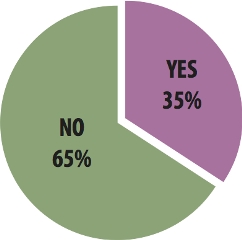New ECFA Survey Reveals Distinctions between 'Secular' Board Governance and 'Christ-Centered' Board Governance

Also Finds Boards Unprepared for CEO Succession
WINCHESTER, Va., Sept. 29, 2014 /
Christian Newswire/ -- A new survey from ECFA (Evangelical Council for Financial Accountability) (
www.ecfa.org) of CEOs, board chairs, and board members discovered a dramatic and encouraging trend in the awareness of the distinctiveness between how secular and Christ-centered boards of directors operate and govern.
Chart: ECFA's 3rd Annual Nonprofit Governance Survey found that only 35 percent of board chairs said they were prepared to name their next CEO, meaning some organizations could face stark challenges if a sudden change in leadership was required.
The 3rd Annual Nonprofit Governance Survey also found that the majority of boards surveyed are not prepared for CEO succession.
ECFA will host a 3rd Annual Nonprofit Governance Survey Results webinar Sept. 30 at 1 p.m. EDT. Details are available at
Governance Webinar.
The ECFA survey was sent to CEOs, board chairs, and board members of ECFA-accredited organizations and is intended as a tool to help inform and inspire boards and senior management.
According to the survey, there has been an impressive and promising trend over the past three years in how ECFA member boards view their distinctiveness, as opposed to boards of secular organizations. In its first annual survey, only 57 percent of board chairs agreed or strongly agreed with the statement that there are distinctives between how a secular board operates and how a Christ-centered board governs. That number rose to more than 90 percent with the most recent survey.
"After decades of serving on secular and ministry boards, I am convinced that service on ministry boards is significantly different than secular boards, if biblical principles are followed," said Dan Busby, president of ECFA. "That sentiment was expressed much more widely with this survey than just three years ago."
The survey also revealed that only 35 percent of board chairs and 31 percent of board members said they were prepared to name their next CEO, meaning some organizations could face stark challenges if a sudden change in leadership was required.
"It is critical that boards step up in addressing preparedness for CEO succession," Busby said. "The strong continuity of ministries during leadership transitions depends on this proactive planning."
In addition, on the scale of "micromanagement" (1) to "healthy" (10), 35-40 percent of CEOs and board members rated their boards at 7 or less. However, 90 percent asserted they would like to be at "healthy governance" (8, 9 or 10) within 12 to 18 months.
The survey includes a wealth of information about board governance, including nine "Strategic Observations and Insights." Those included such helpful recommendations as "CEOs need more time and engagement from board members," "Most growth occurs in organizations led by boards that excel at generative governance" and five traits associated with boards that are effective.
Additional information about the 3rd Annual Nonprofit Governance Survey will be posted soon at
ECFA Surveys. Information about ECFA is available at
www.ecfa.org.
ECFA, founded in 1979, provides accreditation to nearly 1,900 Christ-centered churches and nonprofit organizations that faithfully demonstrate compliance with the ECFA standards pertaining to financial accountability, fundraising and board governance. To learn more about ECFA, including information about accreditation and a listing of ECFA-accredited members, visit www.ecfa.org or call 1-800-323-9473.

